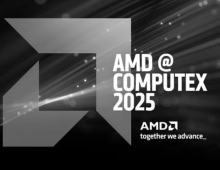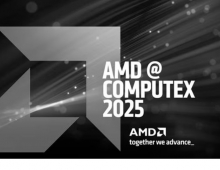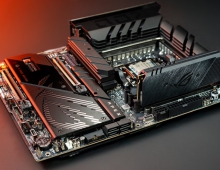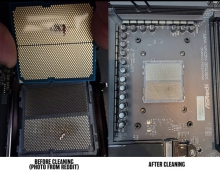
AMD Posts Quarterly Net Loss, Considers Selling Business Units
AMD posted its sixth consecutive quarterly net loss on Thursday as the chip maker continued to lose market share to far larger rival Intel.
The company is hoping that its 'Barcelona' quad-core processor for servers will help reverse market share losses to Intel. The chip had been hampered by a flaw that has since been fixed and it is currently available though AMD's partners.
AMD also, a year ago, promised to give details of an "asset-light" manufacturing strategy, which could include selling its chipmaking plants entirely or having a contract chipmaker like Taiwan Semiconductor Manufacturing Co Ltd make more of its chips.
AMD Chief Executive Hector Ruiz said on a conference call that while there no details to announce immediately, they would be coming in the next three months, or by the end of the year. Apparently this indicates that a decision has been made already.
"We believe will also have an opportunity to further restructure the company for increased focus and added flexibility, which places us in a better position to deliver sustainable, profitable growth," Ruiz said, noting that he hopes to "communicate details in the near future."
AMD remains a generation behind Intel in its chipmaking technology, but if AMD can ramp up production of its Barcelona server chips their competitive price could help the company regain market share. But Intel's own next-generation chip, code-named Nehalem looms.
AMD had said on April 7 that it would cut 10 percent of its work force.
The company said on Thursday that there may be more restructuring in store as it aims to reduce costs so that it can turn a profit on just $1.5 billion in revenue.
AMD's poor results, the company's difficulties to compete with Intel's chip productivity as well as Intel's plans to offer advanced graphics through its new chips have been feeding speculations that AMD would seek to join forces with Nvidia. However such a deal would harm the graphics chip maker?s relationship with Intel.
Some other analysts have also predicted that with AMD shares being so low, it might be a good time for IBM to acquire them. IBM has already a research and development expense-sharing agreement with AMD.
AMD also, a year ago, promised to give details of an "asset-light" manufacturing strategy, which could include selling its chipmaking plants entirely or having a contract chipmaker like Taiwan Semiconductor Manufacturing Co Ltd make more of its chips.
AMD Chief Executive Hector Ruiz said on a conference call that while there no details to announce immediately, they would be coming in the next three months, or by the end of the year. Apparently this indicates that a decision has been made already.
"We believe will also have an opportunity to further restructure the company for increased focus and added flexibility, which places us in a better position to deliver sustainable, profitable growth," Ruiz said, noting that he hopes to "communicate details in the near future."
AMD remains a generation behind Intel in its chipmaking technology, but if AMD can ramp up production of its Barcelona server chips their competitive price could help the company regain market share. But Intel's own next-generation chip, code-named Nehalem looms.
AMD had said on April 7 that it would cut 10 percent of its work force.
The company said on Thursday that there may be more restructuring in store as it aims to reduce costs so that it can turn a profit on just $1.5 billion in revenue.
AMD's poor results, the company's difficulties to compete with Intel's chip productivity as well as Intel's plans to offer advanced graphics through its new chips have been feeding speculations that AMD would seek to join forces with Nvidia. However such a deal would harm the graphics chip maker?s relationship with Intel.
Some other analysts have also predicted that with AMD shares being so low, it might be a good time for IBM to acquire them. IBM has already a research and development expense-sharing agreement with AMD.





















